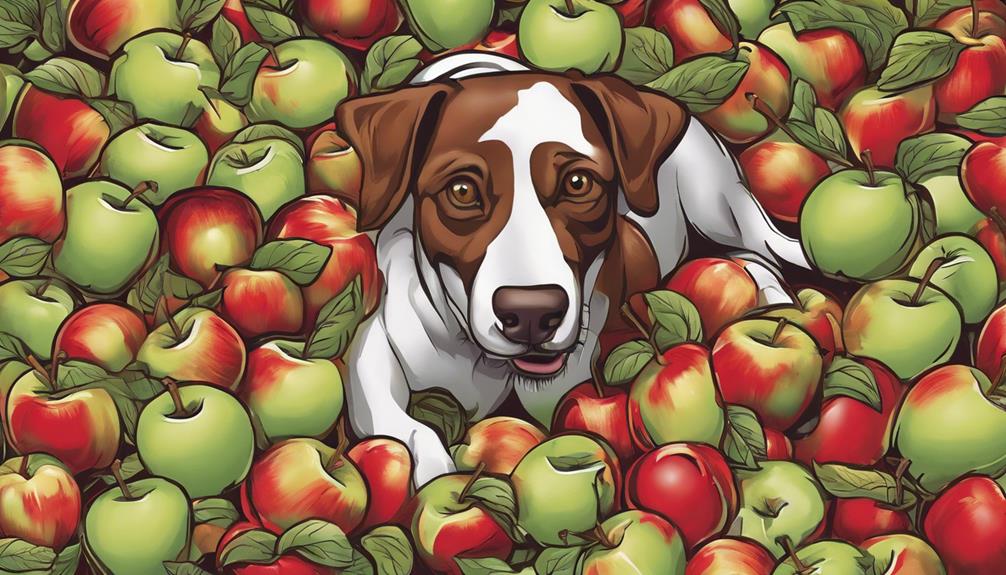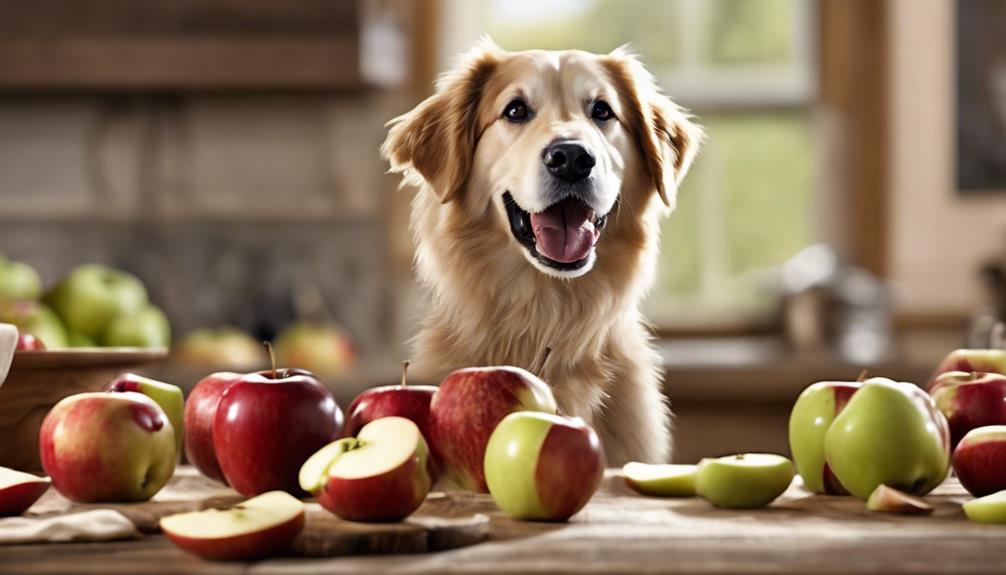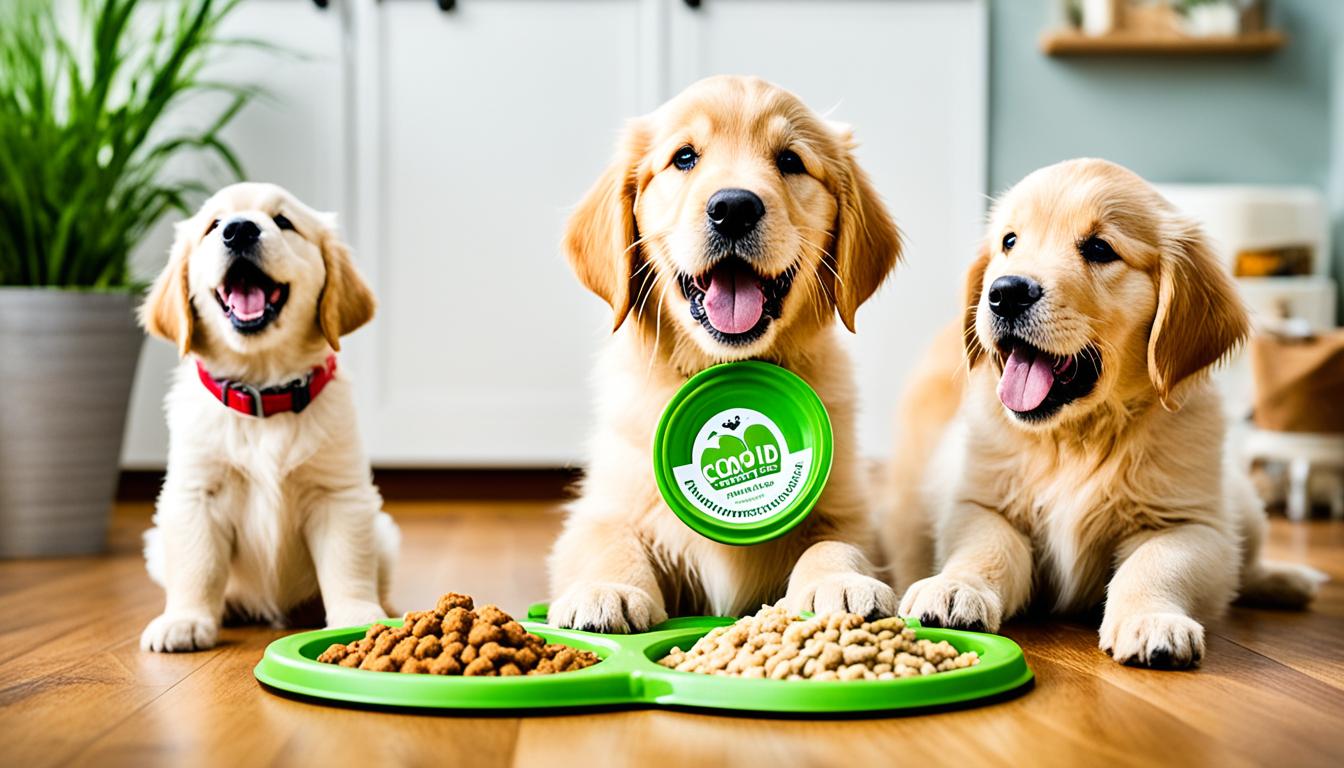When it comes to dogs eating apples safely, the answer may surprise you. While apples are generally considered a safe and healthy treat for our furry companions, there are a few important factors to take into account.
Understanding the potential benefits and risks of feeding apples to dogs is crucial for their overall well-being. Let's explore this topic further to ensure that your furry friend enjoys this fruit in the safest and most beneficial way possible.
Key Takeaways
- Remove apple seeds and core to prevent toxicity and choking hazards.
- Offer apples in moderation to avoid digestive issues in dogs.
- Supervise dogs while they eat apples to ensure safety.
- Consult a veterinarian before introducing apples or any new fruits to your dog.
Apple Safety for Dogs
When feeding apples to dogs, it's crucial to remove the core and seeds to prevent potential toxicity. Apple seeds contain cyanide, which can be harmful if ingested by our furry friends. While apple flesh and skin are generally safe for dogs, the core and seeds should be avoided at all costs. Additionally, peels should be given in moderation as they could lead to digestive problems in some dogs.
To ensure the safety of our canine companions when enjoying apples, it's essential to monitor them closely while they eat. Choking hazards can arise if the apple pieces are too big or if the dog tries to swallow them whole. Signs of discomfort, such as vomiting, diarrhea, or unusual behavior, should be promptly addressed by a veterinarian.
Nutritional Benefits of Apples

Apples offer dogs a nutritious boost, containing essential vitamins, fiber, and antioxidants that support their overall health. Here are four key nutritional benefits of apples for our furry friends:
- Vitamins Galore: Apples are rich in vitamins A and C, vital for maintaining a strong immune system and promoting healthy skin and coat in dogs.
- Fiber Power: The fiber content in apples aids in digestion and can help regulate bowel movements, contributing to a healthy gastrointestinal tract.
- Antioxidant Protection: Apples are packed with antioxidants that assist in fighting off harmful free radicals, potentially lowering the risk of certain diseases.
- Nutrient Support: With calcium and phosphorus among their nutrient profile, apples can contribute to bone health and overall well-being in dogs.
These benefits highlight the value of incorporating apples into a balanced diet for our canine companions. Remember, moderation is key when introducing new foods to your dog's diet to ensure their health and safety.
Serving Apples to Dogs
To ensure the safety and health of your canine companion, it is important to serve apples to dogs cautiously and in moderation. When offering apples to your furry friend, remember to remove the core, seeds, and cut the fruit into bite-sized pieces to prevent choking hazards. Additionally, washing the apple thoroughly to eliminate any pesticides is crucial before letting your dog enjoy this tasty treat. Moderation is key in feeding apples to dogs to avoid potential digestive problems. While apple peels are generally safe for dogs to consume, excessive intake might lead to indigestion. Opt for unsweetened applesauce when sharing this variation with your pet to steer clear of added sugars. Below is a handy table outlining some dos and don'ts when serving apples to your beloved canine:
| Dos | Don'ts |
|---|---|
| Remove core and seeds | Don't give whole apples |
| Cut into small pieces | Avoid apple seeds |
| Wash the apple | Don't offer sugary applesauce |
Risks of Apples for Dogs

With the potential risks associated with apple consumption for dogs, caution and moderation are paramount when introducing this fruit into their diet. Here are some key points to consider:
- Apple seeds contain cyanide, which can be toxic to dogs if ingested in large quantities. It's crucial to remove the seeds before offering apples to your furry friend.
- Choking hazards can arise from dogs eating apple cores or seeds. Always supervise your dog while they're enjoying this treat to prevent any accidents.
- Moderation is crucial to prevent digestive issues from too much apple consumption. Limit the amount of apples given to your dog to avoid stomach upset or diarrhea.
- Excessive apple peels can lead to indigestion in dogs. Consider peeling apples before feeding them to your dog to reduce the risk of digestive problems.
Other Dog-Friendly Fruits
When considering adding variety to your dog's diet, exploring other dog-friendly fruits can provide nutritional benefits and a flavorful experience for your canine companion. Blueberries are a safe option, rich in antioxidants and low in calories, promoting overall health.
Carrots, with their vitamins and minerals, aren't only great for your dog's dental health but also support their eyesight.
Watermelon, a hydrating treat, contains essential vitamins like A, B6, and C, along with heart-healthy lycopene.
Pumpkin is a fiber-packed fruit that aids in canine digestion and provides nutrients such as vitamin A and potassium.
Additionally, strawberries can be a tasty and nutritious snack for dogs, offering vitamin C, fiber, and antioxidants.
When introducing these fruits into your dog's diet, it's essential to do so in moderation and monitor for any adverse reactions. Always consult with your veterinarian to ensure these fruits align with your dog's specific dietary needs.
Frequently Asked Questions
Is It Safe for Dogs to Eat Apples?
Yes, dogs can safely eat apples. Remember to cut them into small pieces, removing the core and seeds. Apples offer vitamins, fiber, and antioxidants. Consult your vet before adding apples or new foods to your dog's diet.
Is CoOKed Apple OK for Dogs?
Yes, cooked apples are generally safe for dogs. Always remove seeds and core before feeding. Nutmeg is toxic, so avoid spiced treats. If symptoms arise, seek vet help. Applesauce in moderation is a tasty option.
Is It Okay for Dogs to Eat Apple Cores?
We must avoid feeding dogs apple cores due to potential choking hazards, tough digestibility, and toxic cyanide in the seeds. Always remove cores and seeds before giving apples to dogs for their safety and well-being.
Can Dogs Have Apples With Skin?
Yes, dogs can have apples with skin. It's safe and nutritious, providing fiber and vitamins. Remember to wash thoroughly to remove pesticides. The skin aids dental health. Introduce slowly to check for digestive issues.
Conclusion
In conclusion, apples can be a safe and healthy treat for our furry friends when served in moderation and with proper precautions. Remember, an apple a day keeps the vet away!
Always consult with a veterinarian before introducing new foods into your dog's diet to ensure their well-being and overall health. Enjoy watching your pup enjoy this nutritious snack, but remember to remove the core and seeds before serving.









